
What is night for all beings is the time of awakening for the self-controlled; and the time of awakening for all beings is night for the introspective sage.
[Bhagavad-gita 2:69]
When two people or things are completely different or exact opposites, it is sometimes said that they are as different as night and day. So it is with the devotee of the Lord – the self-controlled and introspective sage – and the common man who remains spiritually asleep and wanders in a sleeping condition through dreams of happiness and distress. Such persons live in different worlds.
The common man thinks that happiness lies in his material achievements, thinking that if he or she has beauty, wealth, fame, an attractive partner and a fine home then life is a success and they will be happy. A saintly person, on the other hand, understands that the pursuit of such material success is like chasing a mirage in the desert. Why is that? Because no matter how much sense gratification or material success we have, we are never satisfied. And why is this? Because we are the soul within, and no amount of sensual pleasure, no amount of fame and adulation, can actually touch me or fill up the inner emptiness and the longing of the soul to love and serve Krishna, the Supreme Lord.
Lord Chaitanya prays:
O almighty Lord, I have no desire to accumulate wealth, nor do I desire beautiful women, nor do I want any number of followers. I only want Your causeless devotional service in my life, birth after birth.
What does the word “introspective” mean? It means to be self-examining – to look within. Jesus once said: “The Kingdom of God lies within.” A sincere devotee looks within, analyses his thoughts, emotions and motivations and roots out the undesirable qualities like a gardener pulling out weeds. But the common man doesn’t like to look too deeply, being afraid of what they may find. They’d rather pretend “I’m OK, I’m a good person.” How much we want to love God will determine how introspective we become. The devotee wants to taste pure love for Krishna, but he sees that there are obstacles blocking the way that have to be removed. There are no jerks in the spiritual world, so to be fit to enter the kingdom of God we have to stop being jerks.
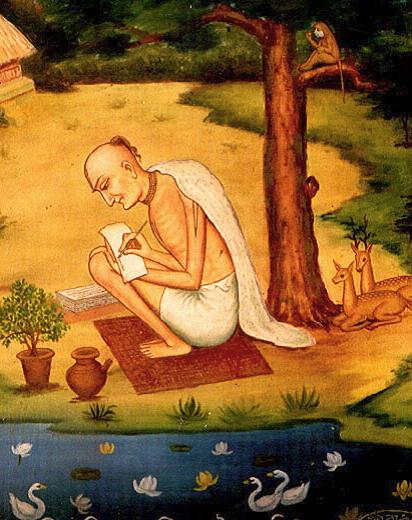
The focus of the devotee is on the inner world of spiritual devotion. The focus of the common man is outwards towards the world of the senses. The desire for fame and material success is a great impediment to spiritual life. They are products of the false ego’s desire for recognition and respect, to be “number one.” In the Lord’s Prayer, Lord Jesus Christ said, “For Thine is the kingdom, the power and the glory.” We should not attempt to set up our own kingdom, where we are the king – the holder of power and focus of glory. So, the sincere devotee and the common man are moving in opposite directions. What is seen as advancement for the materialist is a polar opposite to what is seen as advancement for the devotee.
The age of positive thinking and “believe in yourself” has morphed into the selfie age. Recently there was an ad on TV for a chain of fitness gyms. A personal trainer is saying: “What I love most about my job is seeing people learning to love themselves. That is the greatest gift you can give anyone.” There was a time when it was considered vain and egotistical to love yourself – yourself, of course is referring to the material body, not the real you, the soul within. Growing up, if someone had tickets on themselves – had a very high estimation of their own greatness – people would say:
I love myself. I think I’m grand.
I love to sit and hold my hand.
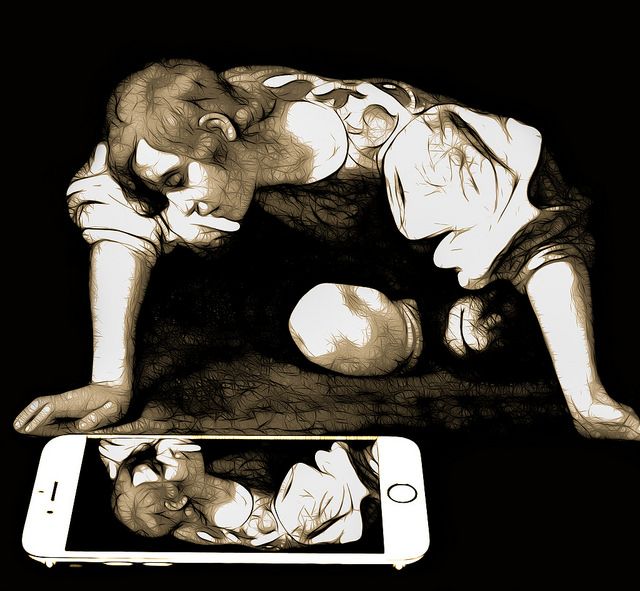
The Modern Day Narcissus
In the material world, everyone wants to be highest, number one, the best in their field of endeavour. We crave recognition and respect. Our reputation is dear to us. And the positive thinkers teach us to love ourselves – “we cannot love others unless we first love ourselves,” they say. And so, identifying ourselves with our material bodies, we are taught to love our bodies. One positive thinker has a technique for increasing self-esteem by giving positive affirmations about every part of our body.

We start by saying, “I love my toes,” then move on up the body: “I love my ankles, I love my calves, I love my thighs, I love my butt, I love my genitals, I love my big fat gut” etc. all the way up to the top of the head. And this is supposed to make me feel good about “myself.” Of course, it’s all artificial, and if I think “I’m the body,” and the body is ugly, I will not really believe I am beautiful. Especially when I compare my body with the airbrushed supermodels or digitally enhanced actors and actresses who work out for hours every day with their personal trainers to prolong their careers for a few more years.
And even if my body is beautiful, it will not last. The pride I feel when I look in the mirror or post my ten millionth selfie, or others comment about how attractive I look, is based on a mirage, or a will-o-the-wisp. If my self-esteem comes from my bodily beauty, I am in deep shit because my body will eventually sag, wrinkle and deteriorate until the flesh rots off my bones. My mother had a macabre sense of humour, and she used to sing a little ditty which may have planted a seed in my consciousness:
Dear Mary Jones, she’s been dead for weeks
The worms are eating her rosy cheeks
And whenever she drops her chin
A worm’ll crawl out and a worm’ll crawl in.
And isn’t it nice to know
The worms are waiting for us below
And whenever we drop our chin
A worm’ll crawl out and a worm’ll crawl in.
No amount of plastic surgery, botox injections, silicone implants or exercise and diet regimes will keep my body hot and ready to trot forever. If my self-worth really depends on my bodily beauty, then there’s no real point living past forty. One of the saddest things is to see a person who has traded almost exclusively on their beauty, trying desperately to hold back the tide of time, as their imagined worth dissolves year by year.
A similar scenario is played out in the mental sphere. There is great suffering for the famous author who has run out of ideas, or had a couple of best-sellers followed by a series of flops. Or the brilliant physicist or philosopher who has developed Alzheimer’s disease and is starting to dement, and is going from being a brilliant and influential intellectual giant to a poor old codger who no one wants to listen to.
So, the materialistic mentality wants us to be seen as a great faultless person, to puff up the false-ego. But the devotee, as he becomes more and more purified by the chanting of the holy names, becomes more acutely aware of his faults and begs Krishna to help him. He works on his faults and they gradually disappear. For the common man, it is often too hard to admit you have faults and put in the hard and painful work of improving yourself. It is better to deny that you have a problem with lust, anger, greed, envy and fault-finding. To pretend that they are not there or somehow blame someone else for your problems. And the faults we see in others are often the faults we don’t want to face within ourselves. As Lord Jesus said:
Why do you look at the speck of sawdust in your brother’s eye and pay no attention to the plank in your own eye?
[Matthew 7:3]

Or as Tusta Krishna das once said:
People ignore their own faults. It’s like walking into the lounge room and finding a big dog shit on the floor. And instead of cleaning it up, they just place a rug over it and pretend it’s not there.
Rather than taking responsibility for the messes we make in our own lives, we often tend to place the blame on something or someone else.
Me: Alright, let’s see who’s been sabotaging my life:

One time I had the opportunity to meet a great devotee of the Lord. I had heard many wonderful stories about this person, and as I stood before her, I wanted to make a good impression – but instead, all of the worst things I’d ever done or said or thought came flooding into my mind. And I knew that she could see them all. I felt like I was standing naked before her and felt incredibly ashamed and embarrassed. She was very kind and friendly to me, asked me about myself and wanted to hear some stories I had told a common friend.
But later that evening, she gave a class. She said something to the effect that as we progress in spiritual life, we are made more aware of the polluted and envious nature of our mind, and if we are disturbed by this it is a great blessing. She used the analogy of making ghee. Ghee is made by heating butter, and as the butter is heated the impurities rise to the surface and are strained off until eventually no more impurities appear and we are left with clarified butter or ghee.

So, in a similar way, as we chant and our hearts become gradually purified, the bad qualities, lust, anger, greed, envy etc. will at times rise to the surface and we become horrified and think, “Shit man, what’s happening here – I’m worse than I ever was.” But actually, we are being purified. We feel mortified and we humbly beg Krishna and our spiritual master for help, and in this way our hearts become cleansed by the Lord’s mercy.
When I was studying psychiatric nursing, one of the subjects was Ego Defence Mechanisms. Sigmund Freud noted a number of ego defences which he refers to throughout his written works. He described them as psychological strategies that are unconsciously used to protect a person from anxiety or embarrassment arising from unacceptable thoughts or feelings. He taught that we use these defence mechanisms to protect ourselves from feelings of anxiety or guilt, which arise because our ego feels threatened. Some of these ego defence mechanisms include denial, displacement, repression, projection and rationalization. In Freudian psychiatry, these ego defence mechanisms are seen as natural and normal ways of protecting the false-ego so that we don’t have to face our faults or shortcomings.
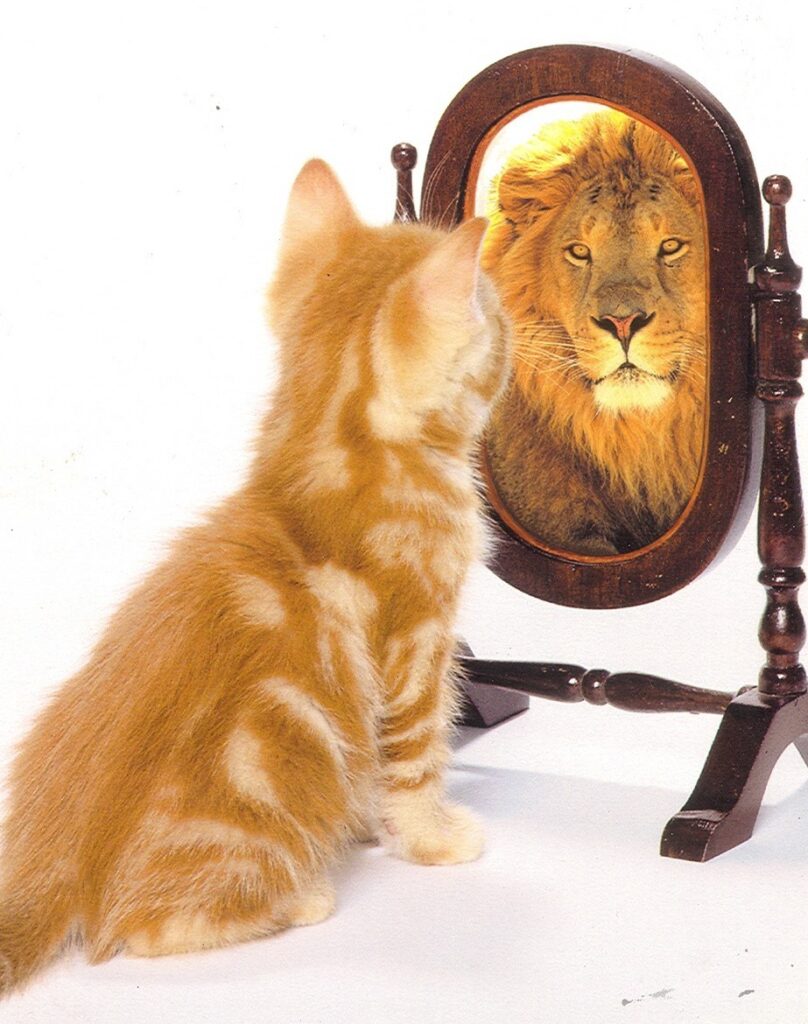
“Ego is not a dirty word,” to quote the Skyhooks. Ego means my actual identity – who I really am. What Freudian psychiatrists and others call ego, we call the false ego, because whereas they identify themselves as being the material body and the mind, the devotee understands his true ego or identity is spirit soul, eternal servant of Krishna. Thus, these ego defence mechanisms are our enemies, not our friends. In Freudian psychiatry, guilt is seen as a most undesirable enemy of the ego, a hang-up we need to eliminate. But if guilt is so bad, then the most advanced person is the psychopath – he can murder people for pleasure without feeling remorse or shame. Guilt and shame are actually healthy reactions when we know we have done the wrong thing or hurt someone else. Granny used to say, “You should be ashamed of yourself” and she was right.
Nor is low self-esteem, or what the psychologists call an “inferiority complex,” the equivalent of humility. Low self-esteem is just the flip-side and inevitable outcome of false prestige. They’re both based on false bodily identification. It’s like sooner or later, whatever goes up must come down. Whatever makes us proud today will embarrass us sooner or later. Nothing material lasts forever. If self-esteem, feeling good about “ourselves,” is the upside of the false ego, then the inferiority complex is the down side. They are just two of the dualities of the material world, the opposite sides of the same coin.
What we need to realize is that not only are we not the body, but factually this body is not even our possession. The gross body and the subtle body, the mind, both belong to Krishna. They are his material energies. Krishna says in Bhagavad gita:
Earth, water, fire, air, ether, mind, intelligence and false ego – altogether these eight comprise My separated material energies.
[Bhagavad-gita 7:4]
And anything else we may be proud of within the material sphere is also the energy and property of Krishna. Krishna makes this very clear in the seventh and tenth chapters of Bhagavad gita:
Of all that is material and all that is spiritual in this world, know for certain that I am both the origin and the dissolution. … I am the ability in man … the intelligence of the intelligent, and the prowess of all powerful men.
[Bhagavad-gita 7:6, 8, 10-11]

… of the splendid I am the splendor. I am victory, I am adventure, and I am the strength of the strong. … of the wise, I am wisdom. … Know that all beautiful, glorious and mighty creations spring from but a spark of My splendor.
[Bhagavad-gita 10:36, 37, 41]
Factually, there is absolutely nothing that we can be proud of or take credit for in our appearance, abilities, actions or achievements. Everything we are and everything we have is given to us by Krishna, and it is His alone. And even if we are so easily deluded that we remain puffed up, thinking that our body is still beautiful and attractive when the bloom of youth is ready for the compost heap; or that we are still witty and fascinating when everyone else sees us as a boring old fart, does this really help us? Factually, this whole infatuation with shallow self-esteem is diametrically opposed to the reality of our actual spiritual identity. In spiritual life, lower is higher. In fact, humility, not pride, is the foundation upon which spiritual life is based.
And real humility is in no way a negative experience. Jagad Guru Siddhaswarupananda once described humility as the realization that “I am the active, conscious servant of the Supreme Person.” Humility means to see how great Krishna is, and how small and helpless we are in comparison. It is a positive experience, and it enables us to taste the blissfulness of spiritual love, to be rightly situated in our eternal identity, and to achieve wonderful things in Krishna’s service.
And it is possible to be experiencing great humility and yet be extremely confident and positive – confident in Krishna’s protection, love and His empowerment of His surrendered servants. Not confident in our own talents, abilities, wisdom and attractiveness, but confident that we can achieve what Krishna wills us to achieve. Just like the small child feels no fear when she is with her father, but feels brave, secure and protected. We can be Krishna’s puppet and He will pull the strings and make us dance for His pleasure. With surrender to Krishna we are never alone. The devotee relishes being at Krishna’s feet and at the feet of his spiritual master. This is humility. The thought of being God or being worshipped is abhorrent to such a humble devotee. Lord Chaitanya prayed:
One should chant the Holy Names of the Lord in a humble state of mind, feeling oneself to be lower than the straw in the street. One should be more tolerant than the tree, devoid of all sense of false prestige, and ready to offer all respects to others. In such a state of mind one can chant the Holy Names of the Lord constantly.

In spiritual life, lower is higher. Lord Chaitanya’s third prayer holds the key to success in spiritual life. We should understand that our reason for entering into the material world is due to our jealousy of Krishna – we are desirous of being Lord, of being worshiped and respected by others. We all want to be Krishna – the All-Attractive One. And this false ego, or false identity of being Lord, is like a tight knot that binds us to the material world. The Sanskrit word for false-ego is ahankara, which means “knot,” because we are trapped on the wheel of birth and death, bound like an animal heading for the slaughter, by the knot of false ego. So rather than trying to convince ourselves and others that we are great, to be successful in spiritual life we have to move downwards rather than floating upwards holding onto the balloon of pride. Balloons are very fragile – they burst very easily and the higher we float the further we will have to fall.
Question: You recently quoted a verse from the prayer Sri Guru Carana Padma in one of your classes:
[Our spiritual master is the ocean of mercy, the friend of the poor, and the Lord and master of the devotees. O master, be merciful unto me, give me the shade of your lotus feet. Your fame is spread all over the three worlds.]
We were wondering why it’s referred to as “lotus feet.” Hope you can elaborate a bit more on that.
Answer: The feet of the spiritual master are described as being transcendentally beautiful and fragrant like the lotus flower. The lotus flower grows out of the mud but is never contaminated – it rises above the mud and remains pure and unsullied. In a similar way, the spiritual master belongs in the spiritual world but out of great compassion he descends to this world to save the fallen souls. And although his feet appear to be walking in this world, he is never touched by this world – he is transcendental to it.
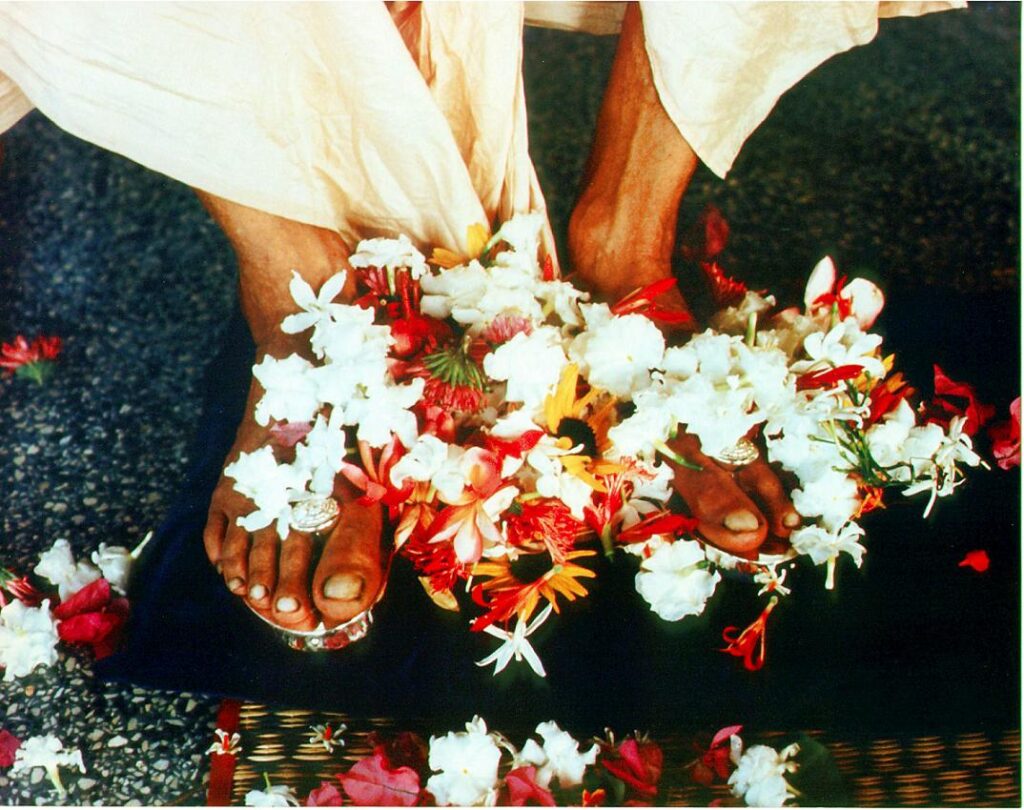
Taking shelter of the lotus feet of the spiritual master, one is not taking shelter of a thing of this world. The spiritual master’s lotus feet are transcendental, and only reached and appreciated by great spiritual humility. Surrender to the lotus feet of the spiritual master is not an external thing, and to fall down before the guru’s feet – the lowest point – signifies an act of great humility. This goes on within one’s heart, not just with the external body. And taking shelter at the guru’s lotus feet is not different to taking shelter of Krishna’s lotus feet.
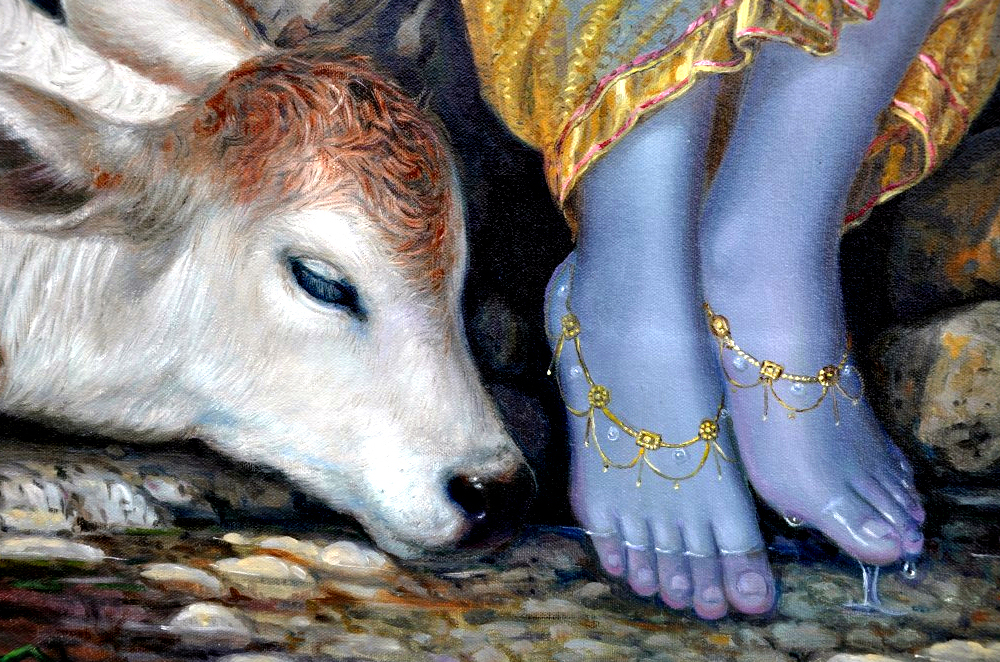
Srila Sridhara Swami prays:
O transcendentally blissful guru, when my mind finally achieves a place at your lotus feet, all the tiresome labour of my spiritual practices will be finished, and by your mercy I will experience the greatest happiness.


Leave A Reply